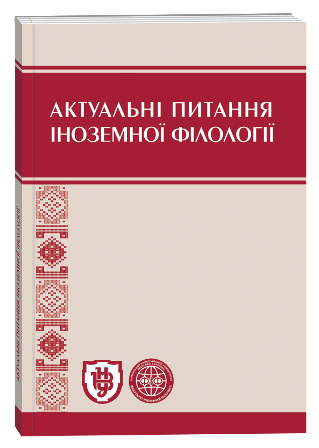SOCIAL СONDITIONALITY OF FRENCH YOUTH SPEECH: LINGUISTIC AND PRAGMATIC ASPECT
DOI:
https://doi.org/10.32782/2410-0927-2022-16-16Keywords:
sociolect, youth speech, sociolinguistic features, linguopragmatic features, the French languageAbstract
The article is devoted to the study of French youth speech, its linguistic and pragmatic features through the prism of social factors, which determine the existence of youth sociolect. It was discovered that the term “sociolect” is convenient to denote diverse and dissimilar language formations, endowed with a common feature, namely fulfilling the communicative needs of socially allocated groups of people. In particular, the notion of youth sociolect was clarified as a specific vocabulary of a certain group of young people aged 10 to 25 years, reflecting the features of their cultural preferences and the desire to emphasize their belonging to this social group. Determination of sociolinguistic and linguopragmatic features with the subsequent substantial interpretation, classification and generalization was carried out with the use of component, contextual analysis and empirical method. The study of the structure of the French youth sociolinguistic vocabulary allowed us to develop a classification of youth speech groups according to such social characteristics as age, gender, education, residence, social status and ethnic origin. We distinguished three groups according to age: the speech of young adolescents (10–14 years old), middle-aged (15–18 years old) and elderly (18–26); according to gender it was divided into female and male; according to education level the speech of schoolchildren, students and workers was distinguished; according to place of residence the speech of young residents of cities, suburbs and villages was determined; ethnic origin allowed to classify young people into native Frenchmen and immigrants. Among other things it was established that the main pragmatic feature of youth speech is highlighting, drawing attention to one, the need to be in the trend and trying to follow current tendencies, this determines the speech behavior of young people, and therefore the selection of certain linguistic means. Such social characteristics of the spoken language of young people as easiness and casual atmosphere of communication, friendly relations between partners in communication, spontaneity of the statement, lack of self-control, direct contact with interlocutors, as well as the need for rapid transfer of information from one partner to another leads to the appearance of various kinds of truncation and verbiage, the use of metaphors, borrowings, verlan, argotisms, etc. The prospects for further research are defined in the identification of lexical and stylistic features of the implementation of the pragmatic potential of youth speech in France and Ukraine in a comparative aspect.
References
Александрова О. В. Молодіжний соціолект як лінгвістичний феномен (до питання термінологічного визначення поняття). Науковий вісник Південноукраїнського національного педагогічного університету ім. К. Д. Ушинського. Лінгвістичні науки. 2014. № 19. С. 3–10.
Боднар Р. В. Соціолект підлітків як субкультура сучасного лінгвосоціуму (на матеріалі англійської мови 90-х років ХХ – початку ХХІ ст.) : автореф. … дис. канд. філол. наук: 10.02.04. Київ, 2007. 20 с.
Врублевська Г. Й. Лінгвокреативні процеси формування молодіжного жаргону. Вісник Житомирського педагогічного університету. 2004. № 14. С. 186–187.
Кондратюк О. В. Молодіжний сленг як мовне явище. Ї: незалежний культурологічний часопис. Львів, 2005. № 38. URL: http://www.ji.lviv.ua/n38texts/38-zmist.htm (дата звернення: 07.04.2022).
Масенко Л. Т. Нариси з соціолінгвістики: посібник. Національний університет «Києво-Могилянська академія». Київ : Києво-Могилянська академія, 2010. 242 с.
Нужна К. А. Соціолінгвістичні особливості молодіжного мовлення Франції : автореф. … дис. канд. філол. наук: 10.02.05. Київ, 2015. 17 с.
Христенко О. С. Німецький молодіжний сленг: лінгвокогнітивний та соціолінгвістичний аспекти : автореф. … дис. канд. філол. наук: 10.02.04. Київ, 2009. 18 с.
Boyer H. Introduction à la sociolinguistique. Paris : Dunod, 2017. 140 p.
Boyer H. “Nouveau français”, “parler jeune” ou “langue des cités”? Langue française. 1997. № 114. Р. 6–15.
Cerquiglini B. Tu parles!? Le français dans tous ses états. Paris : Flammarion, 2000. 415 p.







